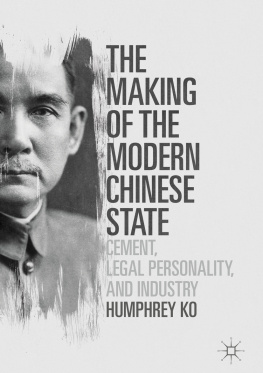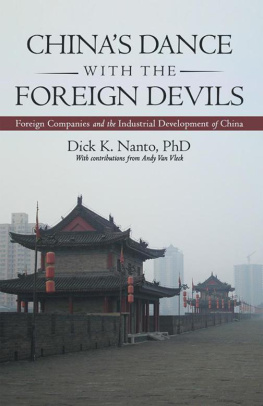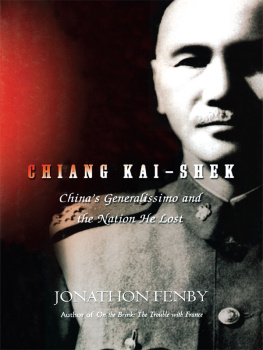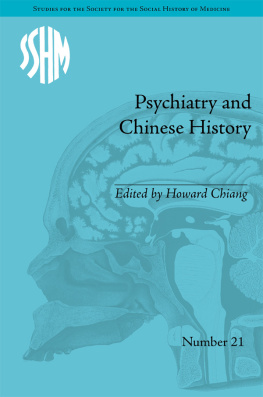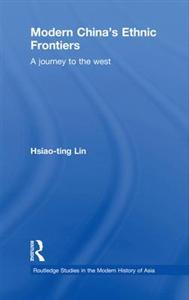1. Introduction: China, Cement and Corporations
A systemic and structural difficulty facing China since the Opium War in the middle of the nineteenth century was the arrival of corporations from the West. Western-type incorporated companies were introduced into the Chinese state in 1904. This progressively gave form to an underlying structure around which history revolved and evolved. The fundamental structural change brought about by the introduction of corporations has so far received very little scholarly attention that concerns Chinas modern history and its struggle with the modern world. The imperial state of late Qing China attempted to emulate the industrialisation of Western powers. Yet, as it embarked upon this task it had to grapple with more than the scientific, technical and logistical challenges thrown up by industrialisation. It had to manage the effects caused by corporations, which form the invisible structural backbone of the modern industrialisation process. Initially the empire did not attempt to adopt the corporation, which is a fictitious legal personality or corporate personality. Instead, it attempted to embrace modern industrial and commercial businesses by merely adjusting its ancient imperial system to suit the new modern requirements for industrial ownership and development. Unfortunately, this failed and the empire also failed because both a modern state and a modern corporate law were needed to accommodate the new kind of business entities which sprouted from industrialisation.
This book will tell the story of how the Chinese state struggled with these modern business entities in their incorporated conditions, and how major political figures such as Sun Yat-sen, Yuan Shikai and Chiang Kai-shek were involved in this process. This book argues for the centrality of the Company Law of 1904, which recognised the corporation as an independent institution and in so doing fundamentally weakened the Chinese state. This is an effort at combining the political history of late Qing and Republican China with business history and legal history. Using the cement industry as a case study, this book focuses on three specific cement companies, which coincidentally were the first three established and functional inside China. They also represent three different types of companies. One was the Qixin Cement Company, which was founded during the Self-Strengthening Movement in North China as an unincorporated imperial firm but was incorporated by Yuan Shikai in 1906. This was a top-down incorporated company. Another was the Guangdong Cement Works, founded in 190609 in South China by provincial officials and run by them as a top-down un incorporated company. The third was the Shanghai Portland Cement Company, founded by the industrialist Liu Hongsheng in the mid-1920s as a bottom-up incorporated company in East China. This work treats the story of each of these three companies in their contextual background in three parts. The time span goes from the 1880s to the Communist takeover in 1949, and the three parts are examined in a largely chronological order.
This work will show that the enterprises founded during the Self-Strengthening Movement in the late nineteenth century may appear like companiesthey issued stocks, for examplebut they lacked the legally recognised independent status of modern corporations. As a result, they were subjected to political machinations and had no defensive shelter. The Company Law of 1904 changed the situation entirely. Owing to the fact that it was incorporated, the Qixin company founded by Yuan Shikai was beyond the reach of the Qing court. It thus started an erosion of the empires political power while enhancing Yuans own economic power and bringing on the Revolution of 1911. In the Republican era after the collapse of imperial China, the local Guangdong government failed to embrace incorporated industries in the late 1920s and early 1930s. Rather, it relied on the Guangzhou City Government as the corporation to consolidate economic power. Yet, redeploying the pre-modern Qing system of enterprise holding (i.e., guanban , shangban and guandu shangban ) did not work in Republican China. This history shows that halting the introduction of Western corporate legal entities in a modernising and industrialising China is unsustainable. Furthermore, corporations flourished in the early Republic, allowing a self-made man like Liu Hongsheng to become wealthy and powerful. But the pendulum began to swing the other way as Chiang Kai-shek took power. By establishing the National Resources Commission around 1932, Chiang began the long process of recapturing economic power at the national level, even as he continued to recognise corporations and legal personality. The Communists, in 1954, went further than Chiang by destroying corporations and corporate personality. In this respect, China in the 1950s went back in time to the situation in the 1880s.
Corporate or legal personality (these two terms are used interchangeably) is a Roman invention but it has evolved into the economic and constitutional structures of modern industrial states. Its commercial manifestationthe modern business (or commercial) corporationis the definitive vehicle for industrialisation and its use is almost universal in the modern industrialised world. Its governmental manifestation is the constitutional state, which is also the foundation of all modern industrialised countries. This book will show that an indistinct but important approach in unlocking the complexities of modern Chinese history is to understand the struggle for the creation of a modern state that could accommodate the modern industrial and commercial businesses brought by industrialisation. This, however, is defined by the limits that legal personality imposed. The commercial corporation and the constitutional state both have legal personalities. They are two entities of the same kind and therefore they may complement or conflict with each other. This leads to an important understanding: a stable modern constitutional state is one that accommodates the industrial economy by way of legal personality in the form of modern legal corporations. This also means that the range of choices available to historical political actors and the consequences of those choices were limited by constraints imposed by legal personality. In other words, legal personality defines modern China. This work traces how legal or corporate personality shaped modern China through the lens of a major industrial business: cement. This industry had individual enterprises incorporated and un incorporated at different times and at different locations, from late Qing to the early Peoples Republic, all of which interacted in some way with Chinas power-holders and institutions.
At first glance, cement (an industrial product) and corporations (a legal entity) seem remote from each other. The former is a physical material and the latter is an abstract legal concern. A closer examination, however, will reveal that they have a common origin: both are Roman inventions and, furthermore, both are in fact important building blocks in the modern industrial society in which we live and work.
What Is a Corporation?
Corporate or Legal personality manifests itself as a corporation. A corporation is a corporate person or legal person . This is an artificial legal entity created by law and formed through the process of incorporation. A corporation could be constituted by a number of natural persons or other legal entities but it always possesses a separate legal identity from them. As a legal entity the corporation receives legal rights and duties. Some rights always exist for a corporation: the ability to sue and be sued; the right to hold assets independent of the assets of its members; the right to hire agents thus employing staff; the right to a common seal thus bestowing to the corporation the right to sign contracts; and the right to make regulations to govern its internal affairs.

